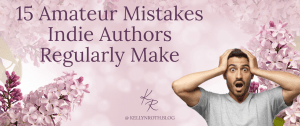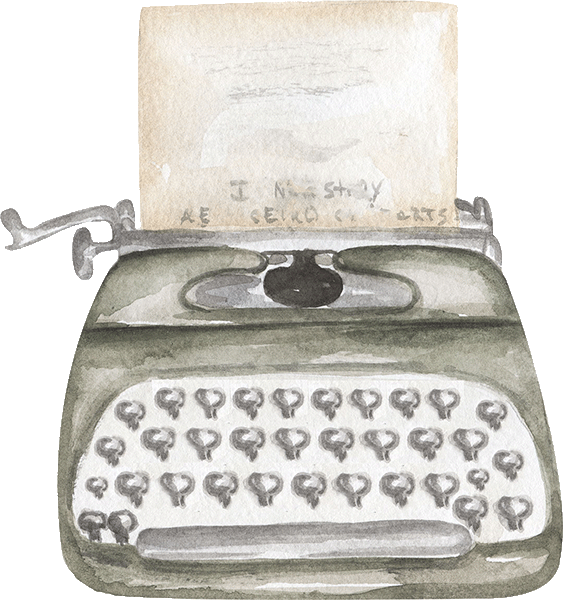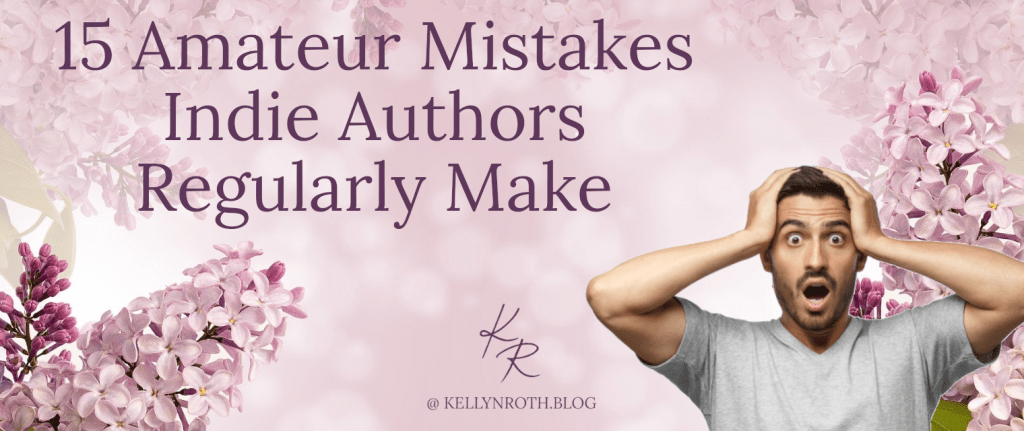
Hello folks! Over the course of 2019 and 2020, I posted a number of posts to Reveries Co.’s website. Since that website is now shut down, I thought I’d repost some of them (with some tweaks) to this blog! Especially since a few were really popular.
Today I want to discuss 15 amateur mistakes I’ve seen indie authors make over the years — and some of which (*coughs* most of which) I’ve made myself!
As someone who spent years correcting my amateurish mistakes, a big passion of mine is helping other authors do the same (or simply avoid making those mistakes altogether). So let’s get into it!

1: Self-editing and not getting other perspectives.
This is the number one issue I would see whenever I read indie novels. It’s just not well-edited!
That’s not the author’s fault, necessarily. No matter how many times you go over your book, you’re going to miss quite a lot — and no matter how great of a writer you are, there are some things only a professional would notice.
This is why I recommend getting a professional editor to work on your novel (in addition to beta readers). It will set you apart from other indie authors from the beginning!
2: Designing their own book covers or hiring a poor cover designer.
Book covers are your public representation of the book’s content! A great book cover is probably the most important marketing tool you’ll ever buy. I could go on for posts and posts about how important they are, but take my word for it: they’re vital.
So why are so many authors making their own book covers? Hiring less than professional designers? Whatever the reason, it’s an amateur make-or-break mistake, so do all you can to avoid it!
Book covers should not just be professional and intriguing, but also represent the book’s genre, and more than that, your book’s niche.
3: Abandoning formatting.
Interior formatting is one of the most underrated services available to authors! Yet, time and time again, I’ve removed a book from my Kindle because various formatting errors made it unreadable.
Also, I confess I cannot read a print book in Arial font. I just can’t. I’ve tried, I’ve failed, but every time I’m faced with a print book in Arial, I give up.
Now, not everyone is as picky and appearance-focused as I am. However, you don’t want to lose a reader just because they appreciate sensory details!
4: Failing to create a preorder launch campaign.
I didn’t realize preorders were a thing until way too far into my publishing career, and I really wish I had! Preorders are a great way to get your book out there before it’s published as well as help skyrocket your rankings on publication day.
Preorder launches mean different things for different people, and there is tons of advice on them out there, so I’ll save the full essay for another day. However, this is a vital part of the authoring journey!
5: An unclear, purposeless, unprofessional website.
If they want more of your books, where do they go? To authorname.com, of course, where they look for more ways to interact with you, more books by you, et cetera.
I’ve stumbled upon many an unclear, purposeless, and unprofessional author website in my day.
Unclear websites fail to communicate who you are and what you’re doing.
Purposeless websites fail to give the viewer an absolute “do this” — whether that is a (non-pushy) “subscribe to my email list & receive this ebook” or an invitation to view your blog.
Unprofessional websites tell the reader you aren’t really in it to win it. If they haven’t read your books, they probably will pass. If they have, that might lower their opinions of you as an author.
It’s better to have no website at all, if you really can’t afford it, than an unprofessional website thrown together on a low-grade server like Weebly, Wix, or WordPress.com.
6: Not understanding genre and reader expectations.
I don’t see as many authors studying genre and reader expectations as I should. It’s important to know what you’re writing and for who, or you’ll never get very far. However, this is an easily-ignored part of the indie author career!
Know who you’re writing for and what other authors have done with your genre, as well as what’s trending at the time you publish. This will help you market more wisely and make decisions in your book that will appeal to your target audience.
7: Having no long-term marketing or publishing plan.
Okay, your book’s out and launched. Now what?
It’s important for indie authors to have a long-term marketing and publishing plan so they can continue selling books after the first rush. Finding ways to present your backlog to new readers is an interesting and challenging game, but it’s well worth exploring.
8: Publishing before they’ve built a platform.
I unfortunately did this. It’s very important to have an audience ready to go before you publish for first book, or you’ll launch it to white noise and swiftly lose it to the depths of Amazon.
Be sure to spend a significant amount of time building your readership before you launch your first book. You want a group of people excited about the book you’re about to put out! And you want those people ready to read and share about your book.
9: Not having a purpose with their social media, blog, and email list.
I see a lot of people who don’t know what audience to reach and therefore post everything and anything on their social media and blog, and sharing anything to their email list.
If you’re doing everything, you must be doing something right … right!?
Unfortunately, that’s not the case. It’s important to create helpful, inspiring, and targeted content through all your platforms and know who you’re trying to reach and why.
10: Failing to set up an email list & email list magnet.
Email lists are a big deal. They’re the only audience you really own, and they’re the ones you can turn into your most loyal subscribers.
Unlike with social media, you won’t be the victim of unfair algorithms or not hitting the exact right post time. You’ll be in their inbox no matter what unless they unsubscribe.
In addition to setting up an email list and encourage people to sign up, you also need a great email list magnet, like a short story or later on a first in series to get them hooked. This free incentive will get people who are interested in you as an author to sign up faster!
11: Not being professional — or being too professional!
There’s a balance to be found between posting blurry selfies with goofy captions and being so stiff, formal, and private that no one can get to know you.
Finding that balance is very difficult, but in the end, it’s worthwhile. It can mean something a little different to everyone.
However, I find that focusing on “friendly but polished” is perfect. A mix of my customer service tone combined with the warmth I’d offer a hurt child who came in my office for a band-aid.
Okay, that’s way too condescending, but you get the point. Kind and personable but still looking like you know what you’re doing!
12: Lack of confidence & not acting like they’re an “actual” published author.
I’ve seen indie authors with things like “aspiring author” in their bio. Uh, no. You’re not aspiring. You’re a published author! (Way to give us all a bad name … Okay, maybe it’s not that bad, but still. You need to have confidence in yourself!)
Take yourself seriously, understand that you’ve done a big thing and will go far, and other people will believe it of you. There’s no need to clarify instantly that you’re an indie author or to say untrue things like you’re just “aspiring.”
13: Failing to publish your second, third, fourth, etc. book.
No one hit wonders, please! Once you’ve published, you need to publish again. You can’t give a starving audience a taste of your awesomeness and then rip it away from them!
Really, though, the best marketing strategy you can have really boils down to “write more books.” Put yourself out there more — share more of your content!
Quality over quantity for sure — but that doesn’t mean you can’t have a quantity of quality.
That said, if you published unprepared and need time before putting out another book, take all the time you need to get to a place of preparation. Your audience can wait!
14: Not giving as much as they’re taking in the bookish community.
I’ve seen a lot of newbie indie authors who want to take, take, take … and never give back! They expect people to follow them and interact with them and buy their books and support them just because they want them to.
(They also expect other authors to be their personal Google. Don’t be that author. Before you ask a question, try looking it up.)
Don’t give in to this entitled attitude! Help others, not because you’ll be rewarded, but because it’s the right thing to do.
15: Giving up too soon.
Don’t give up! Please!
When the going gets hard, the tough get going. Although you may find in the end that indie publishing isn’t right for you, I encourage you not to make that decision simply because it’s more difficult than you’d imagined it would be.
Give yourself time to grow as an author before throwing in the towel. You can do this!
TTFN!
~Kell~
p.s.
Well, those are my best tips! Please tell me that I’m not the only one who made them …? Anddd was this post helpful for you? (I’m trying to decide if I should post writing advice here more or less often.)




7 Responses
This is so helpful!
Thank you, Brooklyne!
Thank you so much for this post, Kellyn! It is so helpful!
This is a great list, Kell! I’d love to see more!
Thank you! 😀 Glad you enjoyed it!
These were great tips!!! ^_^ I’d love it if you did more writing advice posts. 😀
Definitely do more advice posts! I made pretty much every single one of these mistakes, and now I’m having to go back and rectify them and try again with my upcoming novel. I would have loved to have read this two years ago!